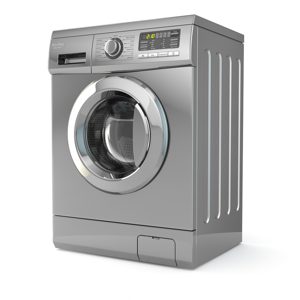 As far as cleanliness and everyday usage is concerned, there’s no more important device for the home than a washing machine. Whether you need to plough through several days worth of dirty clothes, or chuck something on a quick wash to get it on your back before you head off to work, choosing the right washing machine is an important decision. It used to be as simple as just asking, “can it wash clothes?” But nowadays, however, there are all sorts of questions worth considering.
As far as cleanliness and everyday usage is concerned, there’s no more important device for the home than a washing machine. Whether you need to plough through several days worth of dirty clothes, or chuck something on a quick wash to get it on your back before you head off to work, choosing the right washing machine is an important decision. It used to be as simple as just asking, “can it wash clothes?” But nowadays, however, there are all sorts of questions worth considering.
See Also: Tumble Dryers | Ovens, Cookers & Hobs | Fridges & Freezers | Dishwashers
Shops With Washing Machine Offers
Washing Machine Buying Guide
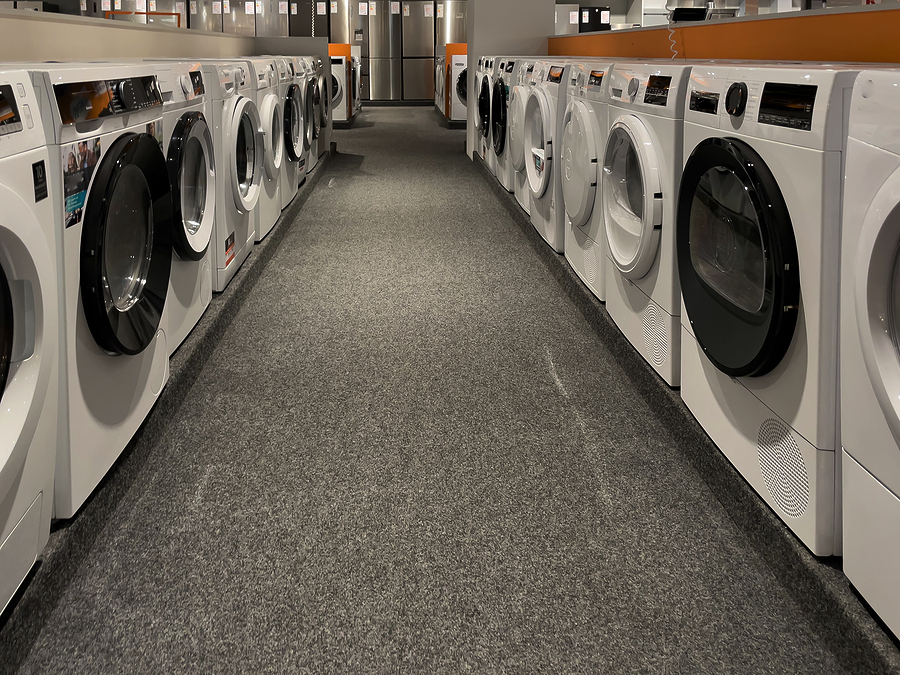
Here is our guide to help you figure out which questions to ask when buying a washing machine and which ones matter the most to you and your household.
Capacity
One of the most important questions you will need to ask yourself when you go washing machine shopping is, does size matter? The bigger it is, the more you can wash. The more you can wash the more money you’ll save in the long run, due to cheaper energy bills and less detergent use etc.
As a rough guide, 1 kg is the equivalent of a full outfit of trousers, a shirt, underpants and socks. Typically machine capacities that you’ll be able to buy range from 5 kg, for machines on the small side, and 12 kg for more impressive machines. Have a large family? Look towards the bigger end of the scale. Live in a flat, do your own washing or prefer to keep your loads as small as you can? A 5 or 6 kg machine will probably be enough for you.
Spin Speed
 Size matters, depending on how much you have to wash and how often you need to wash it. But speed is important too, and it’s not just about getting it over with as quickly as possible.
Size matters, depending on how much you have to wash and how often you need to wash it. But speed is important too, and it’s not just about getting it over with as quickly as possible.
The faster the spin speed of the machine, the more moisture is extracted from the clothes at the end of the wash, meaning they’ll dry quicker when you take them out.
Typically speaking machine spin speeds tend to range from 400 revolutions per minute, or rpm, to about 1800 rpm. The faster spinning machines are better for things like jeans – which take longer to dry – or your perfect outfit that you just can’t wait to wear once it’s been cleaned.
If you just want a middle-of-the-road machine that’s ideal for everyday laundry, then a machine with a spin speed in the 1400-1500 rpm bracket will be ideal. If, however, you don’t like to wait too long to get your clothes on or you don’t particularly like your house looking like a laundry room, then look towards the 1600+ rpm machines.
Noise Levels
 Not an obvious consideration when it comes to washing machines, but important nonetheless. In this day and age, new washing machines have limited their noise output significantly. Why does it matter? Well, if you live in a block of flats, for example, not having the downstairs neighbour complaining every time you do a wash can be crucial in the battle of keeping everyone happy.
Not an obvious consideration when it comes to washing machines, but important nonetheless. In this day and age, new washing machines have limited their noise output significantly. Why does it matter? Well, if you live in a block of flats, for example, not having the downstairs neighbour complaining every time you do a wash can be crucial in the battle of keeping everyone happy.
Equally, if you like to put a wash on at night or live in an open plan space, the quieter the machine is the better. If you’ve got a young family that tends to wake up at the slightest noise, or your washing machine is near to your television and you don’t want to miss any of the sparking dialogue in the latest episode of Game of Thrones, then looking for a quiet machine is vital.
Normally, modern machines range from about 45 dB(A) to around 61 dB(A). Anything operating at under around 50 dB(A) when it’s in the middle of a cycle will be making a noise roughly equivalent to the hum made by a refrigerator. Noise level isn’t the most important thing, but it’ll be worth thinking about depending on your living situation.
Quick Wash
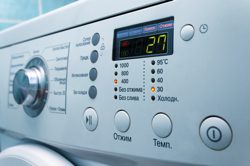 We’ve all been there. You’ve spent all day deciding on the outfit you want to wear when you hit the tiles later that night, but then, just as you’re getting ready to go out, you spill something on your brand new shirt.
We’ve all been there. You’ve spent all day deciding on the outfit you want to wear when you hit the tiles later that night, but then, just as you’re getting ready to go out, you spill something on your brand new shirt.
There are some machines available that can do a wash in as little as 14 minutes. Those sorts of quick washes are for small, lightly soiled clothes, so it’s worth thinking about this feature if you tend to be clumsy or like to wash small loads as fast possible.
Energy Rating
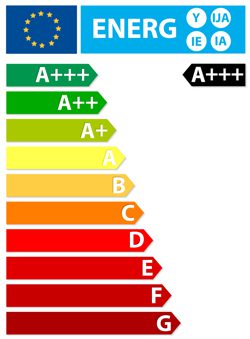 Right or wrong, not everyone cares about the environment. But something that will make everyone sit up and take notice is the reduction in bills from the most energy efficient machines.
Right or wrong, not everyone cares about the environment. But something that will make everyone sit up and take notice is the reduction in bills from the most energy efficient machines.
A washing machine’s energy rating is dependent on several factors, including energy consumption and water usage. The rating system ranges from G to A+++, the latter being the most efficient available and the former being the least.
The grading is decided upon by a series of standardised tests across the industry, and the manufacturers are responsible for grading their own machines.
The reality is that the most energy efficient machines will cost you a little bit more money initially, but they will save you a pretty penny in the long run. The top of the range machines incorporate advanced technology to make adjustments mid-wash to ensure that you get the optimum performance in terms of water usage, temperature, spin speed and wash time.
Reliability
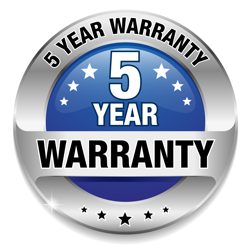 A washing machine isn’t the most expensive thing you’re likely to buy for your home, but neither is it the cheapest. So, it would be nice to ensure you won’t have to buy another one for a few years after you’ve purchased it.
A washing machine isn’t the most expensive thing you’re likely to buy for your home, but neither is it the cheapest. So, it would be nice to ensure you won’t have to buy another one for a few years after you’ve purchased it.
Different manufacturers offer different guarantees about the reliability of their product. The company, Miele, for instance, offers 20 year guarantees on their washing machines in the UK and they’re confident in the workmanship that goes into their products.
A 5-year guarantee is more of the industry standard, but it’s important to remember that these won’t offer you any protection against accidental damage or mishaps. Nowadays washing machines are built to last, but do keep half an eye on what cover you get with the machine you’re looking to purchase.
Wash Programmes
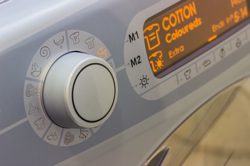 Depending on how sophisticated and modern your machine is, the amount of wash programmes you’ll have available to you will vary. Typically speaking, though, they break down into the following categories:
Depending on how sophisticated and modern your machine is, the amount of wash programmes you’ll have available to you will vary. Typically speaking, though, they break down into the following categories:
- Cottons – these need the most intense washing action
- Synthetics – this includes easy care and needs a more gentle action
- Delicates – Not entirely dissimilar to synthetics, so still quite gentle
- Woollens – these require plenty of water but very little machine agitation
The very latest machines will also have things like hand wash settings (for things like fine wool and silk), mixed wash settings and even variable temperature control so you can decide what you want them to do. You’ll also find plenty of machines that have the ability to drain the water from the machine without spinning it in case you have a delicate garment.
Have a think about the clothes you’re most likely to wash, then make sure that the machine you’re looking to purchase has a setting that can cope with what you want to put it in.
Washer Dryer
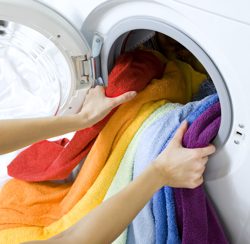 If you don’t have room for a washing machine and a separate tumble dryer then it might be worth considering a washer dryer.
If you don’t have room for a washing machine and a separate tumble dryer then it might be worth considering a washer dryer.
Generally speaking, the same considerations you’ve taken into account when looking at a washing machine also apply to washer dryers. You still need to think about the drum size, noise levels, wash functions and energy rating. The spin speed becomes a little more important now, though, as you can reduce the length of time you put the machine on a drying programme for if your machine has a higher spin speed.
Naturally, a washer dryer is simultaneously the best of both worlds, whilst also being the least of each. Its functions aren’t quite as good as an out and out washing machine or tumble dryer, but it’s a great combination if your circumstances dictate that you just don’t have the space for both of them.
Washer dryers are best for households that don’t tend to do a lot of laundry, but the flipside of that means that a lot of machines will only be able to dry half a drum load at a time, due to the generally smaller size of the machine. Also, you’ll obviously only be able to use the machine for one function at a time. So, if you’re in a larger household that needs to have clothes on a constant rotation of washing and drying, then a washer dryer probably isn’t for you.





